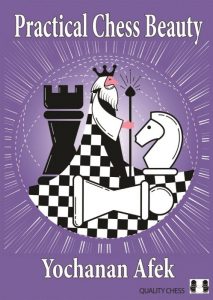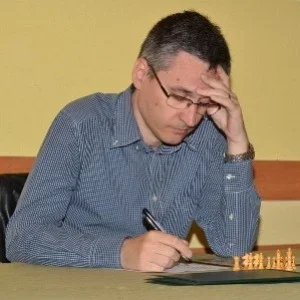Some chess variants and sub-genres are well-known to American audiences. Go to any big scholastic tournament and you will see dozens of “buggers” playing bughouse for hours on end. Despite their intrinsic differences – think instant coffee compared to Geisha in a v60 pourover – the rise of Puzzle Rush makes the idea of solving competitions comprehensible to the outsider. The art of chess composition, however, remains largely hidden in American chess culture. Chess composers create problems (positions with a specified goal and stipulated length) and studies (positions where only the goal is known) of immense technical skill and beauty. Outside of a handful of specialist journals and the odd mainstream chess magazine, compositions only appear as a curiousity, the occasional mate-in-two thrown into a column as a make-weight. This lack of popularity has not dissuaded a handful of American devotees from entering international composition competitions. The results of the 2016-2018 World Championship in Composing for Individuals were announced on June 18th, and four Americans were among those competing for honors in eight fields: twomovers (mate in twos), threemovers (mate in threes), moremovers (mate in more than three), endgame studies, helpmates (both sides ‘work together’ to checkmate Black), selfmates (White forces Black to deliver mate), fairies (problems involving invented pieces), and retros (working backwards from a position to achieve a goal). Judges from around the world worked for nearly five months to score compositions and award prizes. Here is how the Americans did. (Note that all four serve as section editors for Strategems, the official journal for the US Chess Problem Society.)
- #7 in Endgame Studies, with two studies awarded publication in the prestigious FIDE Album
- #21 in moremovers
- #34 in moremovers
- #43 in three movers
- #67 in helpmates
- #7 in retrograde
- #25 in fairies
- #46-47 in helpmates
- #30 in fairies
While retros and fairies are beyond the scope of this writer, I want to take a look at three compositions submitted to this Championship. Two are by Americans, while the third is from one of the problem world’s leading authors. Most chessplayers think of Sam Loyd twomovers when they think of mate compositions, but today’s problems are intricate affairs with complex initial positions and surprising turns of play. Some, like this one from Mike Prcic, also weave known themes into their solutions. Here Prcic honors longtime Chess Life columnist Robert Lincoln, who passed away in 2017, with a submission that includes the “Lincoln Theme.”
[pgn] [Event "Strategems"] [Site "?"] [Date "2018.??.??"] [Round "?"] [White "Prcic, Mike"] [Black "mate in 4"] [Result "*"] [Annotator "Prcic"] [SetUp "1"] [FEN "4n3/6bR/P5p1/K1k2p2/nN2p1p1/4P1N1/b3B2B/3R4 w - - 0 1"] [PlyCount "7"] {Dedicated to Bob Lincoln} 1. Rd7 $1 {(threatening 2.Ne4+ fxe4 3.Bd6+ Sxd6 4.Rc7#)} Bf8 (1... Nc3 2. Nxe4+ Nxe4 3. Bb8 $1 {followed by 4.Ba7#}) (1... Be5 2. Nxe4+ fxe4 3. Bxe5 $1 {followed by 4.Bd4#}) 2. Nxe4+ (2. Rc7+ $2 Kd6 { and the mate exceeds the stipulation.}) 2... fxe4 3. Rc7+ Nxc7 4. Rxc7# { Lincoln Theme in a moremover (done for the first time?). The move 2.Ne4+ is shown four times. In two variations, White makes a quiet third move.} * [/pgn]
Endgame studies are somewhat easier for non-initiates to understand, and authorities like Fabiano Caruana and Mark Dvoretsky have independently spoken of their value for high-level training. Richard Becker is one of the leading study composers working today, and what follows is his highest scoring study from the 2016-2018 Championship. It's White to play and win. [pgn] [Event "10th WCCT, 3rd-4th place"] [Site "?"] [Date "2017.??.??"] [Round "?"] [White "5. Becker R."] [Black "WCCI 10.5"] [Result "1-0"] [SetUp "1"] [FEN "8/pp1k4/8/1R2PR1p/b4K2/1p6/P1P5/4r3 w - - 0 1"] [PlyCount "37"] [EventDate "2017.??.??"] 1. Rd5+ $1 (1. Rxb7+ $2 Kc6 2. Rxb3 (2. axb3 Kxb7 $11) 2... Bxb3 3. axb3 h4 $11 ) 1... Ke7 2. axb3 Rf1+ (2... Bxb3 3. Rc5 $1 $18) 3. Ke4 Re1+ 4. Kd4 Rd1+ 5. Kc5 $1 ({Thematic try} 5. Kc4 Bxb3+ 6. cxb3 Rc1+ 7. Kd4 Rd1+ 8. Ke4 Re1+ 9. Kf4 Rf1+ 10. Kg5 Rg1+ 11. Kh6 Ke6 12. Rg5 Rxg5 13. Kxg5 Kxd5 14. Kf6 h4 15. e6 h3 16. e7 h2 17. e8=Q h1=Q $11) 5... b6+ 6. Kc4 Bxb3+ 7. cxb3 Rc1+ 8. Kd4 Rd1+ 9. Ke4 Re1+ 10. Kf4 Rf1+ 11. Kg5 Rg1+ 12. Kh6 Ke6 13. Rg5 Rxg5 14. Kxg5 Kxd5 15. Kf6 h4 16. e6 h3 17. e7 h2 18. e8=Q h1=Q 19. Qa8+ {wins. Logical study with foresight move by the white King to open the long diagonal.} 1-0 [/pgn]
Top honors in the Study section were taken by Oleg Pervakov of Russia, a Grandmaster of composition and for many years the editor of the Russian chess magazine 64. This was Pervakov’s fourth World Championship. Behind him were (in place order) Martin Minski, Steffen Slumstrup Nielsen, and Sergey Didukh. Becker, as mentioned above, finished in seventh place, while the well-known author, problematist, and over-the-board International Master Yochanan Afek placed eighteenth. His miniature shown below was, for me, one of the competitions’ best. White is to move and win. [pgn] [Event "Hoch-70, 2nd commendation"] [Site "?"] [Date "2016.??.??"] [Round "?"] [White "2. Afek Y."] [Black "WCCI 8"] [Result "1-0"] [SetUp "1"] [FEN "1K6/3kP3/1P6/8/8/3rp3/8/7R w - - 0 1"] [PlyCount "15"] [EventDate "2016.??.??"] 1. b7 e2 (1... Kxe7 2. Rb1 $1 e2 3. Ka7 {(Kc7)} Ra3+ 4. Kb6 $18) 2. e8=Q+ $1 ( 2. Ra1 $2 Re3 $1 3. Ka8 e1=Q 4. Rxe1 Rxe1 5. b8=Q Ra1+ $11) (2. Re1 $2 Re3 3. e8=Q+ Kxe8 $1 (3... Rxe8+ 4. Ka7 Re3 5. b8=Q Ra3+ 6. Kb7 Rb3+ 7. Ka8 $1 Ra3+ 8. Qa7+ $18) 4. Kc7 Rc3+ 5. Kb6 Rb3+ 6. Kc6 Rc3+ 7. Kd6 Rd3+ 8. Kc5 Rb3 9. Rxe2+ Kd7 $11) 2... Kxe8 3. Ra1 $1 (3. Rc1 $2 Kd7 $1 4. Ka7 Ra3+ 5. Kb6 Rb3+ $11) 3... Rd1 (3... Kd7 4. Ka8 $1 Rd1 5. Ra7 $3 e1=Q 6. b8=Q+ $18) 4. Kc7 $1 e1=Q ( 4... Rxa1 5. b8=Q+ Kf7 6. Qb3+ $18) 5. b8=Q+ Ke7 (5... Kf7 6. Qb3+ $18) 6. Qd8+ $3 Rxd8 7. Rxe1+ Kf7 8. Kxd8 $18 1-0 [/pgn]
 Afek’s newly released Practical Chess Beauty (Quality Chess, 2018) is filled with breathtaking compositions that are illustrative of modern study construction, and readers will not fail to be inspired by the positions within. Other over-the-board players have turned to composition. Former World Champion Vassily Smyslov authored well over 100 studies, while Jan Timman has been a leading advocate for, and composer of, studies for some years now. John Nunn composes and solves, competing regularly in both national and international solving competitions.
Afek’s newly released Practical Chess Beauty (Quality Chess, 2018) is filled with breathtaking compositions that are illustrative of modern study construction, and readers will not fail to be inspired by the positions within. Other over-the-board players have turned to composition. Former World Champion Vassily Smyslov authored well over 100 studies, while Jan Timman has been a leading advocate for, and composer of, studies for some years now. John Nunn composes and solves, competing regularly in both national and international solving competitions.
But 12-year-old International Master Christopher Yoo is surely among the youngest composers to win a major award. Yoo took third place (out of 38) in the 2019 FIDE World Cup for the following study. It's White to move and win.
[pgn] [Event "3rd Prize 7th FIDE World Cup"] [Site "?"] [Date "2019.??.??"] [Round "?"] [White "Christopher Yoo"] [Black "?"] [Result "1-0"] [SetUp "1"] [FEN "r7/k1P5/2P5/6P1/PK4p1/Q1N1R3/2p3P1/2n2q2 w - - 0 1"] [PlyCount "17"] [EventDate "2019.??.??"] 1. Re1 $1 (1. Re5 $2 Kb6 $1 2. Nd5+ (2. a5+ Ka7 $1 (2... Ka6 $2 3. Ne2 $1 Qf8+ 4. Rc5 Nxe2 5. Qd3+ $18) 3. a6 Rc8 $11) 2... Ka6 3. c8=Q+ Rxc8 4. Nc7+ Rxc7 5. Ra5+ Kb6 6. Qe3+ Kxc6 7. Qc5+ Kd7 8. Qd5+ Ke7 9. Qe5+ Kd7 10. Rd5+ Kc8 11. Qe8+ Kb7 12. Rb5+ Qxb5+ $1 $11) (1. Ka5 $2 Nb3+ $1 2. Qxb3 Qa6+ 3. Kb4 c1=Q $19) 1... Qxe1 2. Ka5 Nd3 3. Qb4 $1 ({Try:} 3. Qb3 $2 Qxc3+ 4. Qxc3 c1=Q 5. c8=N+ Kb8+ $19) 3... Qxc3 $1 (3... Nxb4 4. Nb5#) 4. c8=N+ $1 (4. Qxc3 $2 c1=Q $19) 4... Rxc8 5. Qxc3 Rxc6 $1 (5... c1=Q 6. Qg7+ Ka8 7. Qb7#) 6. Qxc6 c1=Q 7. Qa6+ (7. Qb6+ $2 Ka8 8. Qa6+ {loss of time}) (7. Qxc1 $2 Nxc1 8. g6 Nb3+ 9. Kb4 Nd4 10. g7 Nc6+ 11. Kc4 Ne7 12. Kd3 Kb6 13. Ke4 Ka5 14. Kf4 g3 $1 15. Kxg3 Nf5+ $11 ) 7... Kb8 8. Qxd3 Qxg5+ 9. Qb5+ $1 {wins} 1-0 [/pgn]
Yoo is on record describing his love of the world of studies, something that no doubt has contributed to his calculative power and impressive imagination. Check out his interview on the Perpetual Chess Podcast for more on this talented young man.
For more information on the world of composition: Books: Dvoretsky, Mark, Oleg Pervakov, and James Marfia (trans). Studies for Practical Players: Improving Calculation and Resourcefulness in the Endgame. Milford: Russell, 2009. Levitt, Jonathan, and David Friedgood. Secrets of Spectacular Chess. London: Batsford, 1995. Nunn, John. Solving in Style. London: G. Allen & Unwin, 1985. Rice, John. Chess Wizardry: The New Abc of Chess Problems. London: Batsford, 1996. -----. Chess Problems for Solving. Sheffield: Waterthorpe Information Services, 1995. Timman, Jan. The Art of the Endgame: My Journeys in the Magical World of Endgame Studies. Alkmaar: New in Chess, 2011. Weblinks The single best introductory resource I have seen for solving problems and studies is by Nigel Nettheim. https://sites.google.com/site/ajcc2015/tournament-details/problem-solving Journals StrateGems, published by the ‘Good Companions’ group, is the leading American problems and studies journal. Subscriptions are $40/yr. EG, published by ARVES (The Dutch-Flemish Association for Endgame Study), is the world’s premier journal devoted exclusively to endgame studies. Subscriptions are €30/yr.
Categories
Archives
- January 2026 (4)
- December 2025 (27)
- November 2025 (29)
- October 2025 (39)
- September 2025 (27)
- August 2025 (29)
- July 2025 (43)
- June 2025 (25)
- May 2025 (24)
- April 2025 (29)
- March 2025 (29)
- February 2025 (20)
- January 2025 (24)
- December 2024 (34)
- November 2024 (18)
- October 2024 (35)
- September 2024 (23)
- August 2024 (27)
- July 2024 (44)
- June 2024 (27)
- May 2024 (31)
- April 2024 (51)
- March 2024 (34)
- February 2024 (25)
- January 2024 (26)
- December 2023 (29)
- November 2023 (26)
- October 2023 (37)
- September 2023 (27)
- August 2023 (37)
- July 2023 (47)
- June 2023 (33)
- May 2023 (37)
- April 2023 (45)
- March 2023 (37)
- February 2023 (28)
- January 2023 (31)
- December 2022 (23)
- November 2022 (32)
- October 2022 (31)
- September 2022 (19)
- August 2022 (39)
- July 2022 (32)
- June 2022 (35)
- May 2022 (21)
- April 2022 (31)
- March 2022 (33)
- February 2022 (21)
- January 2022 (27)
- December 2021 (36)
- November 2021 (34)
- October 2021 (25)
- September 2021 (25)
- August 2021 (41)
- July 2021 (36)
- June 2021 (29)
- May 2021 (29)
- April 2021 (31)
- March 2021 (33)
- February 2021 (28)
- January 2021 (29)
- December 2020 (38)
- November 2020 (40)
- October 2020 (41)
- September 2020 (35)
- August 2020 (38)
- July 2020 (36)
- June 2020 (46)
- May 2020 (42)
- April 2020 (37)
- March 2020 (60)
- February 2020 (38)
- January 2020 (45)
- December 2019 (34)
- November 2019 (35)
- October 2019 (42)
- September 2019 (45)
- August 2019 (56)
- July 2019 (44)
- June 2019 (35)
- May 2019 (40)
- April 2019 (48)
- March 2019 (61)
- February 2019 (39)
- January 2019 (30)
- December 2018 (29)
- November 2018 (51)
- October 2018 (45)
- September 2018 (29)
- August 2018 (49)
- July 2018 (35)
- June 2018 (31)
- May 2018 (39)
- April 2018 (31)
- March 2018 (26)
- February 2018 (33)
- January 2018 (30)
- December 2017 (26)
- November 2017 (24)
- October 2017 (30)
- September 2017 (30)
- August 2017 (31)
- July 2017 (28)
- June 2017 (32)
- May 2017 (26)
- April 2017 (37)
- March 2017 (28)
- February 2017 (30)
- January 2017 (27)
- December 2016 (29)
- November 2016 (24)
- October 2016 (32)
- September 2016 (31)
- August 2016 (27)
- July 2016 (24)
- June 2016 (26)
- May 2016 (19)
- April 2016 (30)
- March 2016 (36)
- February 2016 (28)
- January 2016 (32)
- December 2015 (26)
- November 2015 (23)
- October 2015 (16)
- September 2015 (28)
- August 2015 (28)
- July 2015 (6)
- June 2015 (1)
- May 2015 (2)
- April 2015 (1)
- February 2015 (3)
- January 2015 (1)
- December 2014 (1)
- July 2010 (1)
- October 1991 (1)
- August 1989 (1)
- January 1988 (1)
- December 1983 (1)











